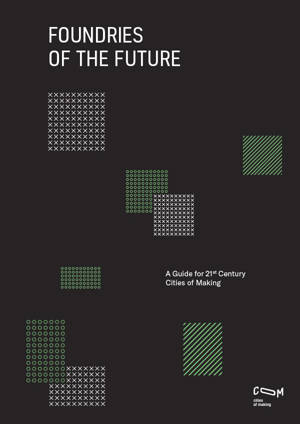
- Retrait gratuit dans votre magasin Club
- 7.000.000 titres dans notre catalogue
- Payer en toute sécurité
- Toujours un magasin près de chez vous
- Retrait gratuit dans votre magasin Club
- 7.000.0000 titres dans notre catalogue
- Payer en toute sécurité
- Toujours un magasin près de chez vous
Foundries of the Future
A Guide for 21st Century Cities of Making
Ben Croxford, Teresa Domenech, Birgit Hausleitner, Adrian Vickery Hill, Han Meyer, Alexandre Orban, Victor Munoz Sanz, Fabio Vanin, Josie Warden
Livre broché | Anglais
19,95 €
+ 39 points
Description
Despite the odds, manufacturing is not in terminal decay in western cities. On the contrary, it is at the opening of a new chapter. Urban manufacturing can help cities to be more innovative, circular, inclusive and resilient.
Since the 1970s, cities world-wide have been witness to radical de-industrialisation. Manufacturing was considered incompatible with urban life and was actively pushed out. As economies have grown, public officials and developers have instinctively shifted their priorities to short-term, high-yielding land uses such as offices, retail space and housing. Inner-city growth from New York to London and even Seoul have generally come at the expense of land uses such as manufacturing or logistics.
More recently, with increasing interest in the circular economy, with cleaner and more compact technology, with more progressive building codes for mixed use, with increasing awareness of the impacts of social inequality and with a clearer understanding of the value chains between the trade of material and immaterial goods, cities across the world are realising that manufacturing has an important place in the 21st century urban economy.
While both enthusiasm for making is increasing and the value of manufacturing is becoming increasingly evident in cities, the topic remains extremely complex and challenging to manage. This book attempts to shed light on the ways manufacturing can address urban challenges, it exposes constraints for the manufacturing sector and provides fifty patterns for working with urban manufacturing. This book has been written to help politicians, public authorities, planners, designers and community organisations to be able to plan, discuss and collaborate by developing more productive urban manufacturing.
Since the 1970s, cities world-wide have been witness to radical de-industrialisation. Manufacturing was considered incompatible with urban life and was actively pushed out. As economies have grown, public officials and developers have instinctively shifted their priorities to short-term, high-yielding land uses such as offices, retail space and housing. Inner-city growth from New York to London and even Seoul have generally come at the expense of land uses such as manufacturing or logistics.
More recently, with increasing interest in the circular economy, with cleaner and more compact technology, with more progressive building codes for mixed use, with increasing awareness of the impacts of social inequality and with a clearer understanding of the value chains between the trade of material and immaterial goods, cities across the world are realising that manufacturing has an important place in the 21st century urban economy.
While both enthusiasm for making is increasing and the value of manufacturing is becoming increasingly evident in cities, the topic remains extremely complex and challenging to manage. This book attempts to shed light on the ways manufacturing can address urban challenges, it exposes constraints for the manufacturing sector and provides fifty patterns for working with urban manufacturing. This book has been written to help politicians, public authorities, planners, designers and community organisations to be able to plan, discuss and collaborate by developing more productive urban manufacturing.
Spécifications
Parties prenantes
- Auteur(s) :
- Editeur:
Contenu
- Nombre de pages :
- 252
- Langue:
- Anglais
Caractéristiques
- EAN:
- 9789463662475
- Date de parution :
- 20-01-20
- Format:
- Livre broché
- Dimensions :
- 170 mm x 240 mm
- Poids :
- 649 g

Les avis
Nous publions uniquement les avis qui respectent les conditions requises. Consultez nos conditions pour les avis.






